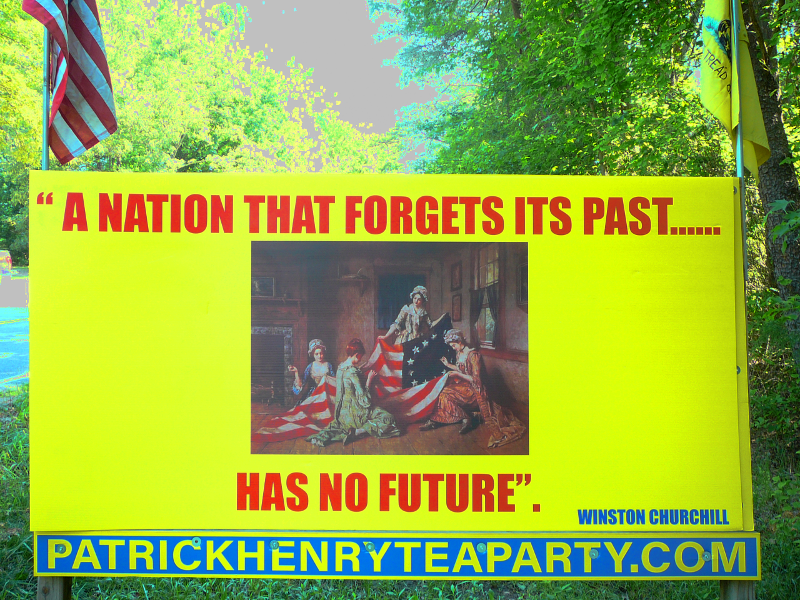
It’s unlikely that Winston Churchill actually said these words in just this way, but this particular Tea Party sign correctly notes that we must understand our past if we want a prosperous future. This isn’t easy – understanding America’s past requires a critical examination of ancestors’ sins against the ideals they claimed as their core national promise: an indivisible nation of liberty and justice for all. Part of my project as an activist and candidate is to make room for a discussion of America’s past with those who would turn back time.
Last Thursday I had the pleasure of attending the Hanover Chapter of the NAACP forum on Critical Race Theory (CRT). Thanks to professors Faye Belgrave and Paul Perrin of VCU for taking the time to help our community understand this very important approach to understanding race and racism in America.
CRT is a framework for understanding racism, individual and institutional, in America. We cannot create a just society without an examining the legal regime that protects discrimination, whether de facto or de jure. So I was also very happy to see quite a few Hanover County conservative activists in the room, and hoped they would see that CRT isn’t about blaming or shaming anyone for what happened in the past – it’s about informing a just American future.
For example, Dr. Perrin shared a few statistics on racial disparities in family wealth and income, health outcomes, and incarceration rates. These patterns suggest institutional causes, he pointed out, and the CRT project is about identifying them. It focuses on figuring out how and why these disparities exist, not on blaming anyone for them. Certainly not middle school students.
Historians and educators must understand their sources and teach, in age-appropriate ways, about slavery, genocide against native Americans, Black Codes, Jim Crow, and other problematic historical truths. America must acknowledge these original national sins before we can beg absolution and forgiveness for them. I defended this great country for 20 years, not because I think it’s perfect today. I defended it because I know America is the agent bending the arc of history toward justice and that More Perfect Union.
Sadly, my conservative friends still fear a conversation about race and how we can strengthen the national bonds that bind us a a people. Craig “the Hatchet Man” Johnson sat in the front row, but later made a long video that completely mischaracterized the presentation. He also clearly states his position against any historical national self-examination, but his reasons amount to a jumble of buzzwords, like “marxism,” intended more to frighten than to illuminate. Any critical discussion of America’s past threatens the Constitution and our Way of Life, he says – which betrays his lack of confidence in our system and our people.
After the presentation I mingled a bit with a few of the folks I’ve met at Tea Party meetings. Shook hands with Scott Wyatt and asked him to debate. He demurred but didn’t exactly say no.
One person asked me about my stance on the Second Amendment. “Trained and trusted” is the key, I responded. Bearing arms is about safe and effective use of firearms, as part of the militia constituted by legal authority (sometimes known as a posse), in defense of community. It’s not about anyone and everyone having as many weapons of any kind they want.
Another wanted my thoughts on the election audits in Arizona. We need election audits, I said, to protect the system by finding and fixing problems. But any audit must include strict chain of custody systems the Maricopa audits did not.
I got a lot of insight from these short conversations. Yes, we can stand in a parking lot and chat. No, few minds will change much without a core agreement about what right looks like. And we can’t arrive at a shared understanding about what right looks like without a frank examination of past wrongs.
I’m running for the House of Delegates because I want to be an agent of change based on a broad consensus on what right looks like. We need to build a coalition of Virginians in support of a community with rules that protect all of us from disease, hunger, racism and violence. A community with rules that bind all of us equally. Because this is what right looks like.
To find out more, take a look at my campaign website. If you’d like to volunteer, you can sign up there. And as always, you can support the campaign financially on ActBlue, or just send a check.
